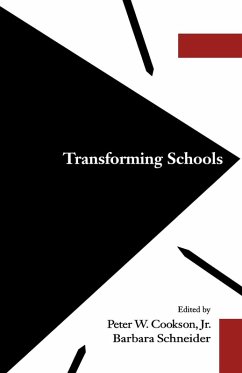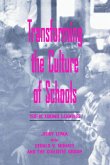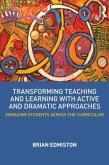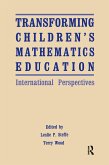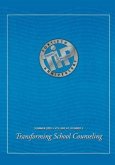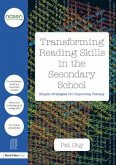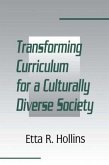Peter W. Jr. Cookson / Barbara Schneider (eds.)
Transforming Schools
Herausgeber: Cookson, Peter W. Jr.; Schneider, Barbara
Peter W. Jr. Cookson / Barbara Schneider (eds.)
Transforming Schools
Herausgeber: Cookson, Peter W. Jr.; Schneider, Barbara
- Broschiertes Buch
- Merkliste
- Auf die Merkliste
- Bewerten Bewerten
- Teilen
- Produkt teilen
- Produkterinnerung
- Produkterinnerung
First Published in 1995. Routledge is an imprint of Taylor & Francis, an informa company.
Andere Kunden interessierten sich auch für
![Transforming the Culture of Schools Transforming the Culture of Schools]() Jerry LipkaTransforming the Culture of Schools57,99 €
Jerry LipkaTransforming the Culture of Schools57,99 €![Transforming Teaching and Learning with Active and Dramatic Approaches Transforming Teaching and Learning with Active and Dramatic Approaches]() Brian EdmistonTransforming Teaching and Learning with Active and Dramatic Approaches103,99 €
Brian EdmistonTransforming Teaching and Learning with Active and Dramatic Approaches103,99 €![Transforming Children's Mathematics Education Transforming Children's Mathematics Education]() Transforming Children's Mathematics Education34,99 €
Transforming Children's Mathematics Education34,99 €![Languaging Relations for Transforming the Literacy and Language Arts Classroom Languaging Relations for Transforming the Literacy and Language Arts Classroom]() Languaging Relations for Transforming the Literacy and Language Arts Classroom59,99 €
Languaging Relations for Transforming the Literacy and Language Arts Classroom59,99 €![Transforming School Counseling Transforming School Counseling]() Transforming School Counseling34,99 €
Transforming School Counseling34,99 €![Transforming Reading Skills in the Secondary School Transforming Reading Skills in the Secondary School]() Pat GuyTransforming Reading Skills in the Secondary School39,99 €
Pat GuyTransforming Reading Skills in the Secondary School39,99 €![Transforming Curriculum for A Culturally Diverse Society Transforming Curriculum for A Culturally Diverse Society]() Etta R. HollinsTransforming Curriculum for A Culturally Diverse Society69,99 €
Etta R. HollinsTransforming Curriculum for A Culturally Diverse Society69,99 €-
-
-
First Published in 1995. Routledge is an imprint of Taylor & Francis, an informa company.
Hinweis: Dieser Artikel kann nur an eine deutsche Lieferadresse ausgeliefert werden.
Hinweis: Dieser Artikel kann nur an eine deutsche Lieferadresse ausgeliefert werden.
Produktdetails
- Produktdetails
- Verlag: Routledge
- Seitenzahl: 626
- Erscheinungstermin: 1. Mai 1995
- Englisch
- Abmessung: 216mm x 140mm x 33mm
- Gewicht: 776g
- ISBN-13: 9780815315339
- ISBN-10: 0815315333
- Artikelnr.: 22112021
- Herstellerkennzeichnung
- Libri GmbH
- Europaallee 1
- 36244 Bad Hersfeld
- gpsr@libri.de
- Verlag: Routledge
- Seitenzahl: 626
- Erscheinungstermin: 1. Mai 1995
- Englisch
- Abmessung: 216mm x 140mm x 33mm
- Gewicht: 776g
- ISBN-13: 9780815315339
- ISBN-10: 0815315333
- Artikelnr.: 22112021
- Herstellerkennzeichnung
- Libri GmbH
- Europaallee 1
- 36244 Bad Hersfeld
- gpsr@libri.de
Cookson, Peter W. Jr.; Schneider, Barbara
Contents
Section I: Conditions for Educational Opportunities
*Schooling
Achievement
and Mobility
Aaron M. Pallas
*Tracking and Detracking Practices: Relevance for Learning
Maureen T. Hallinan
*Parental Ties to the School and Community and Mathematics Achievement
Chandra Muller
*Reading Reality More Carefully Than Books: A Structural Approach to Race and Class Differences in Adolescent Educational Performance
Roslyn Arlin Mickelson
Sumie Okazaki
Dunchun Zheng
*Dropouts: Definitions
Causes
Consequences and Remedies
Gary Natriello
*Section II: Changing Definitions of Education
*Mapping Knowledge Perspectives in Studies of Educational Change
Rolland G. Paulston
*Expanding Definitions of Learning and Teaching: Notes from the MI Underground
Mindy Kornhaber and Mara Krechevsky
*Thinking Like a Fish: The Implications of the Image of School Community for Connections Between Parents and Schools
Mary Erina Driscoll
*Neighborhoods and Corporations: Community Influence on Education Reform
Kathryn Borman and Debra A. Martinson with Louis Castenell
Karen Gallagher and Sally Kilgore
*Schools Must Do More For Children-Child Advocacy as an Educational Responsibility
Judith H. Cohen
*Section III: Learning and Assessment
*The Context of Cultural Inventions: Learning and Curriculum
Ivor F. Goodson
*The Politics of a National Curriculum
Michael W. Apple
*The Role of Standards and Assessments in a National Model of Reform
David Stevenson
*High School Curriculum Differentiation and Postsecondary Outcomes
Thomas B. Hoffer
Section IV: New Strategies for Solving Educational Problems
*Policy
Knowledge and Power: Some Issues for the Study of Educational Reform
Thomas S. Popkewitz
*Can the Big-City School System be Governed
Kenneth K. Wong
*Administrative Leadership and the Crisis in the Study of Educational Administration: Technical Rationality and Its Aftermath
James G. and Hanne B. Mawhinney with the assistance of Jerald Paquette
*Privatization: Integrating Private Services in Public Schools
Ellen B. Goldring and Anna V. Shaw Sullivan
*Why School Choice? A Question of Values
Peter Cookson and Barbara Schneider
Special Features*wide coverage of important topics in education policy at both federal and local levels *section introductions give succinct views of the significance of each essay
Section I: Conditions for Educational Opportunities
*Schooling
Achievement
and Mobility
Aaron M. Pallas
*Tracking and Detracking Practices: Relevance for Learning
Maureen T. Hallinan
*Parental Ties to the School and Community and Mathematics Achievement
Chandra Muller
*Reading Reality More Carefully Than Books: A Structural Approach to Race and Class Differences in Adolescent Educational Performance
Roslyn Arlin Mickelson
Sumie Okazaki
Dunchun Zheng
*Dropouts: Definitions
Causes
Consequences and Remedies
Gary Natriello
*Section II: Changing Definitions of Education
*Mapping Knowledge Perspectives in Studies of Educational Change
Rolland G. Paulston
*Expanding Definitions of Learning and Teaching: Notes from the MI Underground
Mindy Kornhaber and Mara Krechevsky
*Thinking Like a Fish: The Implications of the Image of School Community for Connections Between Parents and Schools
Mary Erina Driscoll
*Neighborhoods and Corporations: Community Influence on Education Reform
Kathryn Borman and Debra A. Martinson with Louis Castenell
Karen Gallagher and Sally Kilgore
*Schools Must Do More For Children-Child Advocacy as an Educational Responsibility
Judith H. Cohen
*Section III: Learning and Assessment
*The Context of Cultural Inventions: Learning and Curriculum
Ivor F. Goodson
*The Politics of a National Curriculum
Michael W. Apple
*The Role of Standards and Assessments in a National Model of Reform
David Stevenson
*High School Curriculum Differentiation and Postsecondary Outcomes
Thomas B. Hoffer
Section IV: New Strategies for Solving Educational Problems
*Policy
Knowledge and Power: Some Issues for the Study of Educational Reform
Thomas S. Popkewitz
*Can the Big-City School System be Governed
Kenneth K. Wong
*Administrative Leadership and the Crisis in the Study of Educational Administration: Technical Rationality and Its Aftermath
James G. and Hanne B. Mawhinney with the assistance of Jerald Paquette
*Privatization: Integrating Private Services in Public Schools
Ellen B. Goldring and Anna V. Shaw Sullivan
*Why School Choice? A Question of Values
Peter Cookson and Barbara Schneider
Special Features*wide coverage of important topics in education policy at both federal and local levels *section introductions give succinct views of the significance of each essay
Contents
Section I: Conditions for Educational Opportunities
*Schooling
Achievement
and Mobility
Aaron M. Pallas
*Tracking and Detracking Practices: Relevance for Learning
Maureen T. Hallinan
*Parental Ties to the School and Community and Mathematics Achievement
Chandra Muller
*Reading Reality More Carefully Than Books: A Structural Approach to Race and Class Differences in Adolescent Educational Performance
Roslyn Arlin Mickelson
Sumie Okazaki
Dunchun Zheng
*Dropouts: Definitions
Causes
Consequences and Remedies
Gary Natriello
*Section II: Changing Definitions of Education
*Mapping Knowledge Perspectives in Studies of Educational Change
Rolland G. Paulston
*Expanding Definitions of Learning and Teaching: Notes from the MI Underground
Mindy Kornhaber and Mara Krechevsky
*Thinking Like a Fish: The Implications of the Image of School Community for Connections Between Parents and Schools
Mary Erina Driscoll
*Neighborhoods and Corporations: Community Influence on Education Reform
Kathryn Borman and Debra A. Martinson with Louis Castenell
Karen Gallagher and Sally Kilgore
*Schools Must Do More For Children-Child Advocacy as an Educational Responsibility
Judith H. Cohen
*Section III: Learning and Assessment
*The Context of Cultural Inventions: Learning and Curriculum
Ivor F. Goodson
*The Politics of a National Curriculum
Michael W. Apple
*The Role of Standards and Assessments in a National Model of Reform
David Stevenson
*High School Curriculum Differentiation and Postsecondary Outcomes
Thomas B. Hoffer
Section IV: New Strategies for Solving Educational Problems
*Policy
Knowledge and Power: Some Issues for the Study of Educational Reform
Thomas S. Popkewitz
*Can the Big-City School System be Governed
Kenneth K. Wong
*Administrative Leadership and the Crisis in the Study of Educational Administration: Technical Rationality and Its Aftermath
James G. and Hanne B. Mawhinney with the assistance of Jerald Paquette
*Privatization: Integrating Private Services in Public Schools
Ellen B. Goldring and Anna V. Shaw Sullivan
*Why School Choice? A Question of Values
Peter Cookson and Barbara Schneider
Special Features*wide coverage of important topics in education policy at both federal and local levels *section introductions give succinct views of the significance of each essay
Section I: Conditions for Educational Opportunities
*Schooling
Achievement
and Mobility
Aaron M. Pallas
*Tracking and Detracking Practices: Relevance for Learning
Maureen T. Hallinan
*Parental Ties to the School and Community and Mathematics Achievement
Chandra Muller
*Reading Reality More Carefully Than Books: A Structural Approach to Race and Class Differences in Adolescent Educational Performance
Roslyn Arlin Mickelson
Sumie Okazaki
Dunchun Zheng
*Dropouts: Definitions
Causes
Consequences and Remedies
Gary Natriello
*Section II: Changing Definitions of Education
*Mapping Knowledge Perspectives in Studies of Educational Change
Rolland G. Paulston
*Expanding Definitions of Learning and Teaching: Notes from the MI Underground
Mindy Kornhaber and Mara Krechevsky
*Thinking Like a Fish: The Implications of the Image of School Community for Connections Between Parents and Schools
Mary Erina Driscoll
*Neighborhoods and Corporations: Community Influence on Education Reform
Kathryn Borman and Debra A. Martinson with Louis Castenell
Karen Gallagher and Sally Kilgore
*Schools Must Do More For Children-Child Advocacy as an Educational Responsibility
Judith H. Cohen
*Section III: Learning and Assessment
*The Context of Cultural Inventions: Learning and Curriculum
Ivor F. Goodson
*The Politics of a National Curriculum
Michael W. Apple
*The Role of Standards and Assessments in a National Model of Reform
David Stevenson
*High School Curriculum Differentiation and Postsecondary Outcomes
Thomas B. Hoffer
Section IV: New Strategies for Solving Educational Problems
*Policy
Knowledge and Power: Some Issues for the Study of Educational Reform
Thomas S. Popkewitz
*Can the Big-City School System be Governed
Kenneth K. Wong
*Administrative Leadership and the Crisis in the Study of Educational Administration: Technical Rationality and Its Aftermath
James G. and Hanne B. Mawhinney with the assistance of Jerald Paquette
*Privatization: Integrating Private Services in Public Schools
Ellen B. Goldring and Anna V. Shaw Sullivan
*Why School Choice? A Question of Values
Peter Cookson and Barbara Schneider
Special Features*wide coverage of important topics in education policy at both federal and local levels *section introductions give succinct views of the significance of each essay

